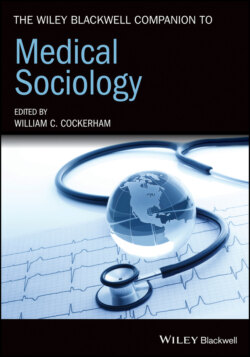Читать книгу The Wiley Blackwell Companion to Medical Sociology - Группа авторов - Страница 88
Embodiment Inequalities in Health
ОглавлениеA basic tenet of medical sociology is that social circumstances – in particular material and social deprivation – become inscribed in people’s bodies. In other words, it is argued that health status is socially determined. The reasons why social circumstances, and more especially social inequalities, impact upon health status have been researched and debated for over centuries. By the turn of the millennium sociologists began to theorize about the links between the sociology of embodiment and health inequalities in ways that provide us with important clues as to why health is socially patterned. Freund (1990) argued that people express “somatically” the conditions of their existence. “Emotional modes of being” he writes are very likely to be linked to structural position.
Subjectivity, social activity and the social structural contexts interpenetrate. It is this relationship that comes to be physically embodied in many ways. Irregularity of breathing may accompany muscular tension and experiences of ontological insecurity and the anger or fear that is part of this insecurity. (Freund 1990: 461)
This link becomes evident when we mesh together the “lived body” and the structural perspectives on the body. How people experience their structural context, the meanings and interpretations, they ascribe to it, in turn impacts their physical bodies (Peacock et al. 2014).
It seems, then, that unequal societies equate to unhealthy societies (Wilkinson and Pickett 2010), or rather unequal societies, are associated with unhealthy bodies. This is not just a result of material deprivation and poverty – the harmful effects of poor housing, poor food, and living conditions per se – though these are undoubtedly important. But what is also important is one’s socio-economic position. Essentially, those people who are lower down the social hierarchy and who have the least control over their circumstances are more likely to be ill. They are more likely to experience prolonged stress and negative emotions, which in turn have physiological consequences. This psychosocial perspective on health inequalities points to a growing body of research that demonstrates how certain aspects of social life, such as a sense of control, perceived social status, strength of affiliations, self-esteem, feelings of ontological insecurity, and so on, lead to variations in health outcomes (Bartley 2016; Elstad 1998).
It seems that how people reflect upon, emote about, and internalize their social position and social circumstances is critical. Drawing from work in physiological anthropology, in particular studies of non-human primates, researchers have found that primates who were lower down the social hierarchy, and most importantly had least control and power, exhibited more detrimental physiological changes in times of stress. Authors have argued this may help explain the fact that numerous studies have consistently found that people in social environments with limited autonomy and control over their circumstances suffer proportionately poor health. The key issue here is the degree of social cohesion. Greater social cohesion means people are more likely to feel secure and “supported” and are less likely to respond negatively when they have to face difficulties or uncertainties. In turn, it is social inequality that serves to undermine social cohesion and the quality of the social fabric (Wilkinson and Pickett 2010)
Through a comprehensive analysis of research that documents the various pathways by which austerity and neo-liberal policies come to be embodied into health outcomes, Sparke (2017) develops the notion “biological sub-citizenship.” This extends Rose and Novas’s (2005) concept of “biological citizenship” articulated to describe how novel forms of citizenship, sociality and collective activism are anchored in and coalesce around shared x (often genetic) characteristics. The prefix “sub” shifts the emphasis from shared biological characteristics and highlights instead “how ill-health embodies changing conditions of political-economic subordination” (Sparke 2017: 287). Sparke writes that,
a concept of biological sub-citizenship is useful precisely because it provides a relational way of theorizing how such embodied outcomes of austerity actively prevent people from becoming fully enfranchised biological citizens. It thereby allows us to re-evaluate ideas about enfranchisement into biological citizenship in relation to dynamics producing differentials of disenfranchisement. (p. 288)
While shared biologies may bring citizens together (biological citizenship), the privileging of global markets combined with neo-liberal economic, health and social policies that systematically disadvantage particular groups can lead to exclusion, exploitation, extraction and so exacerbate precarious embodiment (biological sub-citizenship).
